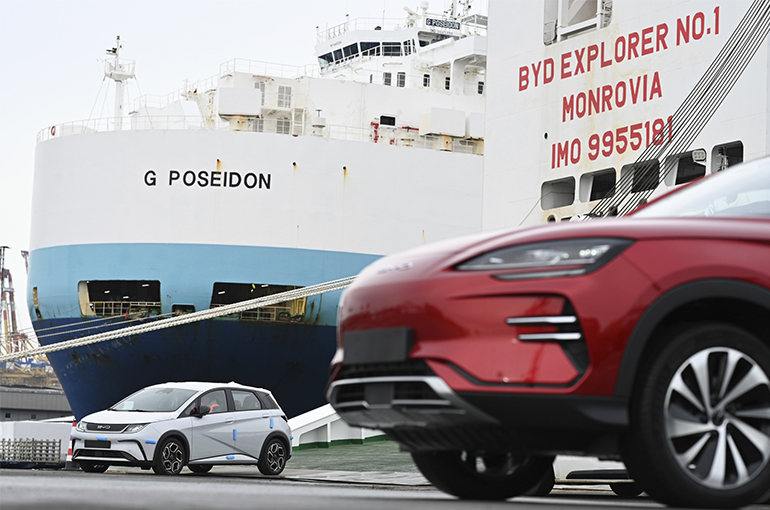 EU Tariffs on Chinese EVs May Drive More Chinese Production Into Europe, Experts Say
EU Tariffs on Chinese EVs May Drive More Chinese Production Into Europe, Experts Say(Yicai) June 14 -- The stock prices of BYD, Geely, Nio and other Chinese electric vehicle manufacturers rose sharply on the mainland and in Hong Kong yesterday after the European Union said it is preparing to impose additional tariffs of up to 38.1 percent on China-made electric vehicles. The move could encourage Chinese automakers to shift more production to Europe, experts said.
The EU will impose provisional countervailing duties ranging from 17.4 percent to 38.1 percent on China-made EVs to offset local subsidies, the EU government said on June 12 following the conclusion of its anti-subsidy investigation launched in October last year.
The duties will differ depending on the brand. BYD, which opened an electric bus factory in Hungary at the end of last year and plans to start producing EVs there too, was slapped with an additional 17.4 percent levy on top of the standard 10 percent tariff. Geely Auto, which plans to shift part of its automotive manufacturing to Belgium, has been ordered to pay an extra 20 percent tax, and SAIC, which does not have a manufacturing presence in Europe yet, had the highest levy imposed at 38.1 percent.
“Localization of production may become a more appealing option in the long run compared to exporting directly from China to circumvent trade conflicts and geopolitical tensions,” said Paul Gong, chief analyst at Swiss banking giant UBS’ auto division.
“Leading Chinese players will probably accelerate the localization of assembly in the EU, which will be welcomed by EU member states like Hungary, Italy and Spain,” said Patrick Hummel, head of Zurich-based UBS’ auto division.
The tariff hikes are ‘quite moderate,’ according to analysts from US financial services firms Morningstar and Citibank.
An additional 17.4 percent tariff hike is manageable for Shenzhen-based BYD, given its significant cost advantages compared with its peers, analysts said. It will essentially iron out the cost advantage and reduce its dominance in other markets.
Going Global
To better integrate into global automotive markets, Chinese EV makers have started to shift production abroad. As of the first half last year, 89 of the top 100 Chinese carmakers and auto parts suppliers had set up overseas factories or R&D centers in Europe, 69 had a presence in Southeast Asia and 62 in North America, according to US consulting firm Accenture.
Most Chinese automakers’ overseas factories are engaged in assembly only, which means it is hard for them to surmount the technical barrier which requires it to use local parts and components, said Accenture, which is based in Dublin for tax reasons.
Many Chinese automakers are taking the ‘going global’ strategy one step further with the establishment of overseas factories. They should generate synergy with local suppliers to accelerate the localization and regionalization of the entire industrial chain while constructing vehicle-manufacturing facilities overseas.
Chinese companies are now leveraging their considerable infrastructure and production capacity to speed up the process of going global, said Liu Xiangping, a global partner at US consultancy firm Bain & Company as well as the person in charge of industrial products, manufacturing and automobiles at Bain’s China arm.
These firms are adopting a more technological approach to going global through industrial upgrading, she said. Most Chinese companies are looking to expand their footprint in the UK and European countries such as Germany, Poland and the Netherlands.
Chinese EV makers should have a long-term development plan, to redefine their marques and create time-honored brands, Liu said. Instead of aiming for the lower end of the pricing tier, they should target medium and high-income customers, she added.
Editor: Kim Taylor